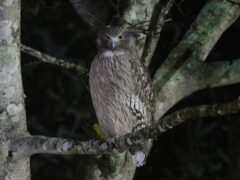Sulu hornbill, silvery pigeon, Magenta petrel, Amsterdam albatross, and the recently reintroduced Spix’s macaw are some of the world’s rarest birds – reduced to critically small numbers, often just tens of individuals. Despite their status, these species can still be found in the wild, if you’re lucky enough to spot them.
10 large white birds with long beaks found in North America
Some of North America’s most distinctive large white birds with long beaks include the American white pelican, whooping crane, wood stork, and white ibis, as well as several white or white-morph herons and egrets. These species are often seen in wetlands, coastal areas, or open waters, where their striking plumage and elongated bills make them […]
8 of the world’s smallest falcons and their unique adaptations
The black-thighed falconet is the world’s smallest falcon, with adult males measuring just 14 centimeters (5.5 inches) in length and weighing as little as 28 grams (1 ounce), while spanning only 27 centimeters (10.6 inches) across the wings. Among true Falco species, the Seychelles kestrel is the smallest, reaching just 15 centimeters (5.9 inches) in […]
4 woodpeckers of the UK, from common drummers to rare visitors
17 birds with the longest tail feathers across the globe
The Reeves’s pheasant holds the record for the longest tail of any living bird, with adult males growing astonishing tail feathers that can reach up to 2.4 meters (7.9 feet) in length. The ribbon-tailed astrapia, on the other hand, boasts the longest tail relative to body size – males of this species grow elegant, white, […]
Eagle meaning and symbolism in myths, legends, and culture
Across cultures and throughout history, eagles have been seen as symbols of strength, freedom, and divine power. They appear as messengers of the gods, emblems of kings and warriors, and guardians of the skies – both revered and feared for their soaring flight and fierce hunting prowess. In some stories, they embody wisdom and protection; […]
8 types of eagles in North America and two rare vagrants
8 of the smallest hummingbird species known to science
The bee hummingbird is the world’s smallest hummingbird, measuring just 5 centimeters (2 inches) in length, weighing as little as 1.6 grams (0.06 ounces), with wingspans as short as 3.25 centimeters (1.28 inches) in particularly small individuals. The gorgeted woodstar is the smallest of the woodstars at just 5.8 centimeters (2.3 inches), while the calliope […]
6 types of tit birds in the UK, and where to find them
Blakiston’s fish owl (Ketupa blakistoni): Riverine giant on the brink
Blakiston’s fish owl (Ketupa blakistoni) is the world’s largest owl and one of the most elusive. Endemic to remote riverine forests of northeast Asia, it is an apex predator uniquely adapted to hunt along streams and ice-free waters. Its massive frame, shaggy plumage, and specialized diet of fish and amphibians set it apart from other […]
31 crested birds with the most striking feathered crowns on their heads
Among birds crowned with head crests, the most distinctive are the grey crowned crane, Atlantic royal flycatcher, Victoria crowned pigeon, Schalow’s turaco, and rufous-crested coquette. But these are just a few examples – across bird families and continents, crests appear in a remarkable range of forms and functions.











